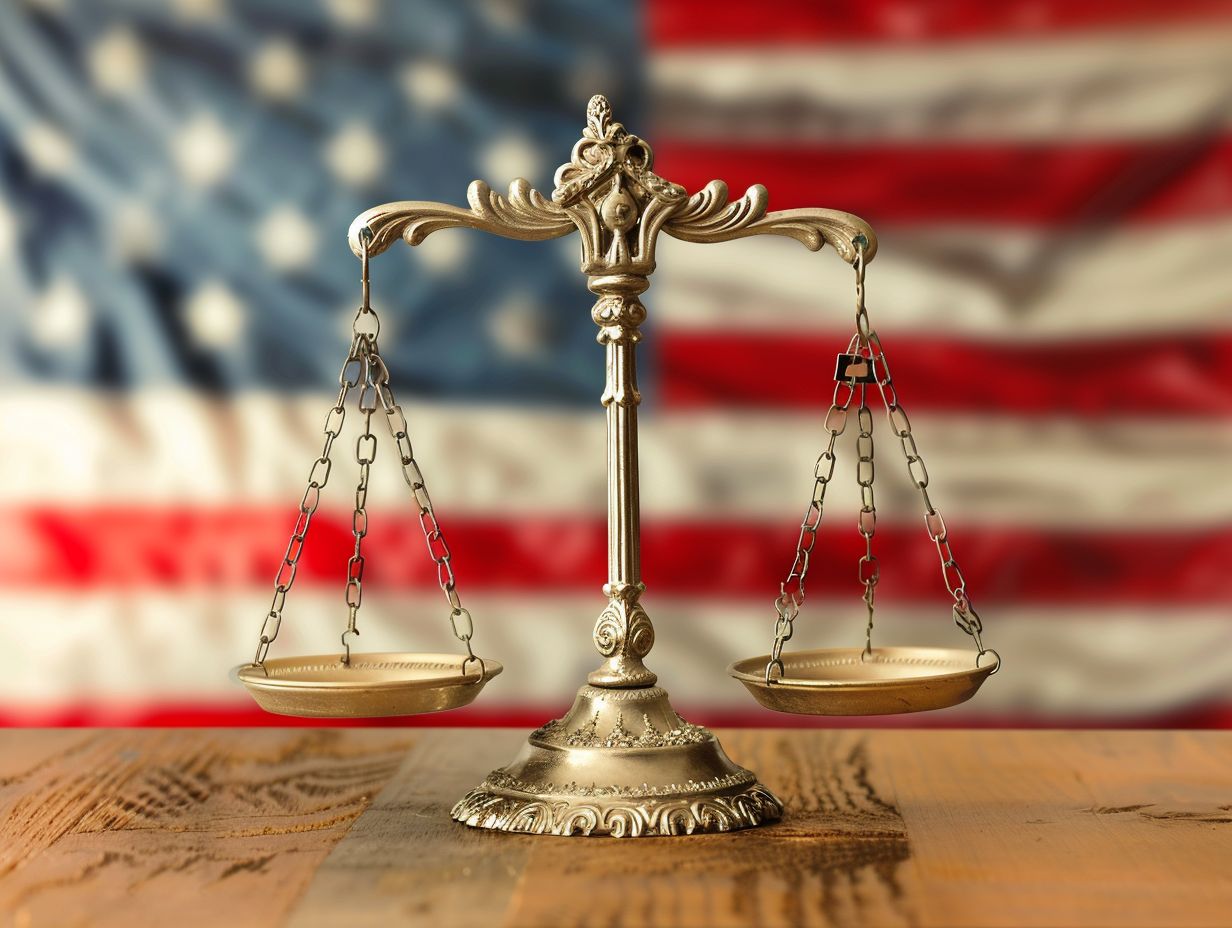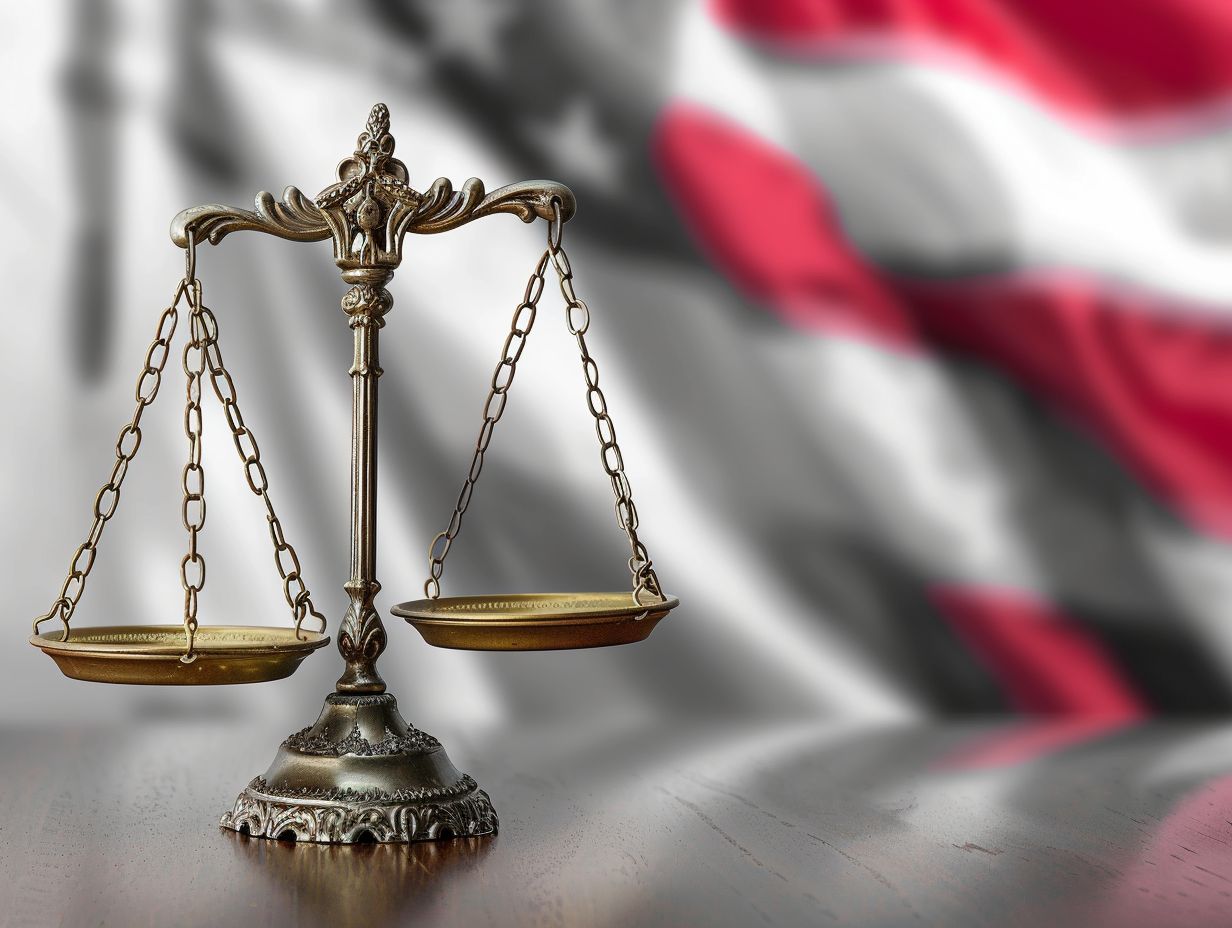Have you ever wondered what exactly trade dress is and how it is protected under Florida’s laws?
We will explore the ins and outs of trade dress, including its legal basis in Florida, the difference between trade dress and trademarks, and what is required for trade dress protection.
We will also delve into examples of trade dress infringement in Florida, the test for infringement, defenses against infringement, and the remedies available for victims.
Stay tuned to learn all about Florida’s trade dress laws!
Key Takeaways:

- Trade dress laws in Florida protect the unique appearance and overall visual design of a product or its packaging.
- To be protected under trade dress laws, a product’s design must be distinctive and non-functional.
- Infringement of trade dress can result in legal action and potential damages, including injunctive relief and monetary compensation.
What is Trade Dress?
Trade dress is the visual appearance of a product or its packaging that indicates the product’s source to consumers. It includes elements like design, color, shape, and overall look, making the product distinctive in the marketplace.
Consistent trade dress elements help companies establish a strong brand identity that consumers can easily recognize and associate with a specific company or product line. For example, the red and white color scheme of Coca-Cola cans and bottles is globally recognizable, symbolizing the brand without needing explicit logos or words.
In the fashion industry, luxury brands like Louis Vuitton use unique patterns, such as the LV monogram, to create their distinctive trade dress and distinguish their products from imitations. These visual cues are essential in fostering brand loyalty and consumer trust.
What are Trade Dress Laws?
Trade dress laws serve the purpose of safeguarding the unique visual appearance of a product or its packaging from any unauthorized copying. This protection helps businesses to preserve their individual brand identities and avoid any potential confusion among consumers, as outlined by federal law.
What is the Purpose of Trade Dress Laws?
The main objective of trade dress laws is to prevent consumer confusion by ensuring products maintain a distinct appearance that identifies their source, thus safeguarding businesses’ brand identities.
These laws are essential in protecting a company’s investment in creating a unique look or design for their products. By granting businesses the ability to safeguard these visual elements, trade dress laws allow them to distinguish themselves in the market and build brand recognition among consumers.
This differentiation is crucial for maintaining market positions and preventing competitors from exploiting a company’s reputation and goodwill. By decreasing the likelihood of consumer confusion between similar-looking products, trade dress laws help create a transparent marketplace where consumers can make well-informed purchasing decisions.
What is the Legal Basis for Trade Dress Laws in Florida?
The legal foundation for trade dress protection in Florida is established in federal law, specifically the Lanham Act, as well as state-level regulations like the Florida Deceptive and Unfair Trade Practices Act.
What is the Lanham Act?
The Lanham Act is a federal law that establishes a framework for the registration and protection of trademarks and trade dress, allowing businesses to safeguard their unique brand elements from potential infringement.
A crucial aspect of the Lanham Act concerning trade dress is that it pertains to the overall appearance and presentation of a product or its packaging, which helps identify and differentiate it from competitors in the market.
To secure legal protection under the Lanham Act, businesses must show that their trade dress is inherently distinctive or has gained secondary meaning. The registration procedure for trade dress mirrors that of trademarks, necessitating an application with the USPTO and meeting specific criteria for uniqueness and non-functionality.
Landmark cases like Two Pesos v. Taco Cabana and Wal-Mart v. Samara Brothers have had a notable impact on the interpretation and implementation of the Lanham Act in trade dress disputes, establishing crucial precedents for the safeguarding of trade dress in the United States.
What is the Florida Deceptive and Unfair Trade Practices Act?

The Florida Deceptive and Unfair Trade Practices Act (FDUTPA) is a state law designed to safeguard consumers and businesses from deceptive, unfair, or misleading trade practices, including those concerning trade dress infringement.
This law establishes specific guidelines and regulations that businesses are required to follow to uphold fair competition in the marketplace. It supplements federal regulations by providing an extra layer of protection and solutions for businesses dealing with trade dress infringement, particularly in Florida.
By furnishing a comprehensive legal framework at the state level, the FDUTPA acts as a valuable tool for businesses to assert their rights and seek remedies against unfair trade practices, such as the unauthorized use of trade dress elements.
What is the Difference Between Trade Dress and Trademarks?
While both trade dress and trademarks are used to identify the source of goods and set them apart from others, trade dress specifically refers to the overall visual appearance of a product or its packaging. In contrast, a trademark typically covers logos, brand names, and symbols.
Trade dress includes aspects such as color schemes, product design, and packaging layout, all contributing to the overall appearance of the product. For instance, the unique shape of the Coca-Cola bottle or the design of the iPhone are significant components of their trade dress.
On the other hand, trademarks are crucial for creating brand recognition and can consist of elements like Nike’s swoosh logo or McDonald’s golden arches. Legal protection for trade dress focuses on the possibility of confusion in the marketplace, while trademark protection aims to prevent consumer confusion and brand dilution.
What is Required for Trade Dress Protection in Florida?
To acquire trade dress protection in Florida, the trade dress must be distinctive and non-functional. The distinctiveness is typically established through secondary meaning, where consumers associate the trade dress with a specific source over time.
What Elements Must be Present for Trade Dress Protection?
The primary components for trade dress protection encompass distinctiveness, non-functionality, and the potential to induce consumer confusion if replicated.
Distinctiveness plays a critical role in trade dress protection by ensuring that a product’s overall appearance or packaging distinguishes it from competitors in the same industry. For example, the iconic Coca-Cola bottle shape is immediately identifiable due to its unique contour, which has been safeguarded under trade dress law.
Non-functionality pertains to elements that are not necessary for the product’s operation but rather serve an aesthetic or branding function. An illustration of this concept is the red soles of Louboutin shoes, which have been acknowledged as a distinctive characteristic.
The occurrence of consumer confusion, if replicated, can result in trademark infringement and the weakening of brand identity. This underscores the importance of trade dress protection in preventing such scenarios.
What is the Functionality Doctrine?
The functionality doctrine states that trade dress cannot be protected if it is essential to the use or purpose of the product or impacts the cost or quality of the product, requiring the trade dress to be non-functional.
For example, in the case of a car manufacturer, the unique shape of the vehicle’s headlights that specifically improve visibility at night would likely be considered functional and therefore not eligible for trade dress protection.
Conversely, a luxury watch brand’s distinctive logo engraved on the watch face, solely for aesthetic reasons and not affecting the timekeeping functionality, could be viewed as non-functional and qualify for trade dress protection. This distinction plays a key role in determining the extent of intellectual property rights a company can assert over its product’s appearance.
What are Examples of Trade Dress Infringement in Florida?
Trade dress infringement cases in Florida frequently entail businesses claiming that a competitor’s product or packaging closely resembles their own, leading to consumer confusion. This is demonstrated by several lawsuits in Miami, where firms such as Jimerson Birr advocate for clients.
What is the Test for Trade Dress Infringement?

The evaluation for trade dress infringement typically involves assessing whether the accused trade dress is likely to cause consumer confusion regarding the source of the products, as determined by the court.
Factors taken into consideration by the court in assessing the likelihood of consumer confusion include the similarity in appearance between the trade dresses, the marketing channels used for the products, and instances of actual consumer confusion.
In the case of Two Pesos, Inc. v. Taco Cabana, Inc., the court ruled that the overall impression of the trade dress, rather than individual components, plays a crucial role in determining confusion.
Similarly, in Au-Tomotive Gold, Inc. v. Volkswagen of America, Inc., the court stressed the importance of assessing the overall commercial impression of the trade dresses to evaluate confusion.
What are Some Defenses Against Trade Dress Infringement?
Common defenses against trade dress infringement claims may include arguing that the trade dress is functional, lacks distinctiveness, or has not acquired secondary meaning. A defense based on functionality maintains that the elements of the trade dress are crucial to the product’s utility rather than serving a merely ornamental or distinctive purpose.
For instance, in a scenario where a car manufacturer faces a lawsuit regarding the design of a headlight alleged to be part of their trade dress, the defense successfully contended that the specific headlight design was purely functional, intended to enhance visibility and safety.
When evaluating these defenses, courts meticulously review evidence to assess the validity of the defendant’s claims and determine if they satisfy the burden of proof necessary to establish a viable defense.
What are the Remedies for Trade Dress Infringement in Florida?
The remedies for trade dress infringement in Florida include monetary damages and injunctive relief, which can prevent the infringing party from persisting in their actions and provide compensation to the injured party.
What Types of Damages can be Awarded?
In trade dress infringement cases, the court may award damages that include actual damages, profits earned by the infringer, and, in some cases, statutory damages.
Actual damages are awarded to compensate the plaintiff for the financial losses suffered as a result of the infringement. These damages typically cover things like lost profits, costs incurred due to the infringement, and any other quantifiable financial harm.
Profits earned by the infringer, on the other hand, refer to the monetary gains made by the defendant through the unauthorized use of the plaintiff’s trade dress. In certain instances, courts may also award statutory damages which are predetermined amounts established by law and are independent of the actual damages or profits involved.
For instance, in a notable case involving trade dress infringement, the court awarded the plaintiff both actual damages and statutory damages to ensure adequate compensation for the harm caused.
What is Injunctive Relief?
Injunctive relief is a court order that can compel the infringer to stop using the infringing trade dress, effectively preventing further infringement and protecting the plaintiff’s trade dress rights.
Legal standards for granting injunctive relief require the plaintiff to demonstrate irreparable harm, likelihood of success on the merits, balancing of hardships, and public interest. Types of injunctions include preliminary injunctions (temporary), permanent injunctions (final), and mandatory injunctions (ordering specific actions).
For example, in the landmark case of eBay Inc. v. MercExchange LLC, the Supreme Court clarified that a plaintiff must demonstrate traditional equitable principles to obtain injunctive relief in patent cases, emphasizing the importance of balancing interests in equitable remedies.
Frequently Asked Questions
What is trade dress and how does it relate to Florida’s laws?

Trade dress refers to the overall appearance and image of a product or service, including its packaging, design, and any other distinctive features that help to identify it in the marketplace. Florida’s laws protect against trade dress infringement, which occurs when someone uses a similar or identical trade dress without authorization.
What types of trade dress are protected under Florida’s laws?
Florida’s trade dress laws protect both registered and unregistered trade dress. Registered trade dress refers to trade dress that has been officially registered with the United States Patent and Trademark Office, while unregistered trade dress refers to trade dress that has not been registered but is still distinctive and recognizable in the marketplace.
How can I prove that my trade dress has been infringed upon in Florida?
In order to prove trade dress infringement in Florida, you must demonstrate that your trade dress is distinctive and has acquired secondary meaning in the marketplace, meaning that consumers associate it with your brand or company. You must also show that the defendant’s use of a similar or identical trade dress is likely to cause confusion among consumers.
What are the potential consequences for trade dress infringement in Florida?
If someone is found to have infringed upon your trade dress in Florida, they may be required to pay damages or profits to compensate for the harm caused. They may also be ordered to stop using the infringing trade dress and may face other legal consequences, such as injunctions or fines.
What should I do if I believe my trade dress has been infringed upon in Florida?
If you believe your trade dress has been infringed upon in Florida, you should consult with a lawyer who has experience with trade dress laws. They can help you to understand your rights and options, as well as guide you through the legal process of enforcing those rights.
Can I use someone else’s trade dress in Florida if I modify it slightly?
No, even if you modify someone else’s trade dress slightly, it may still be considered infringement if it is confusingly similar to the original trade dress. It is important to create and use your own distinctive trade dress to avoid potential legal issues in Florida.























Rate this article:
Average rating 0 / 5. Vote count: 0
No votes so far! Be the first to rate this post.
No Comments yet!